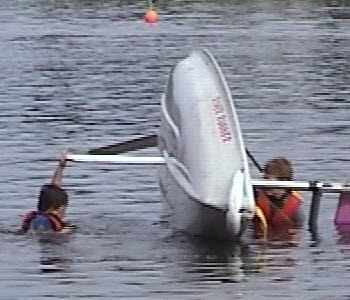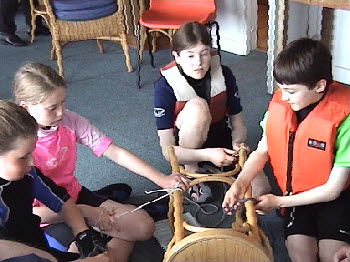THE
MAINSHEET
Summer 2009
Contents
Youth Sailing Programme
This was the brain child of Simon Lunniss and Michael Chipps. They first raised the idea at a Management Committee meeting several months ago. From that point it took a lot of hard work and organisation by a lot of people to bring all the required elements together. Via Nigel we acquired two more Pico's, giving us four in all; the youth sailing programme had to be put together.
As mentioned elsewhere in the newsletter first aid coverage had to be arranged. Enough instructors had to be found to cover the five Saturdays that the course would be held on. Signed parental consent forms had to be obtained and catering had to be arranged for each of the training days. Finally applications for the programme had to be issued.
The response was immediate and a few days later not twelve but fifteen places on the programme had been booked.
9 May -
This was more of a meeting with the trainees and their parents, outlining the course, its purpose and content. It also was a first opportunity for trainees and parents alike to get afloat.
This was followed by afternoon tea and cakes and a question and answer session. The first actual sail instruction was scheduled to start on 23 May.
Each trainee was given a copy of the Aquarius Basic Dinghy Sailing manual and a progress log. (Incidentally copies of these documents are available in the clubhouse if anyone wishes to look at them, but please don't just remove them; the Basic Dinghy Sailing manual is also on the Aquarius website).
23 May -
My eight volunteers turned up at 12:30am for a pre meeting to go over the day's instruction schedule.
Richard Cannon, Tony Hopkins, Rodger Wheeler and Nigel Knowles each had one Pico and a number of trainees to look after. George Bray, Eric Bridgewater and I handle the 'on shore' instruction. Joan Bray had volunteered to man the galley and Bryan Clements manned the safety boat.
This represented quite a commitment on behalf of the club to get this number of busy people together on a Saturday afternoon.
The plan was that half the trainees would go afloat while the other half would start on the shore based stuff. Every hour they would swap, in theory getting two hours each afloat and ashore during each module.
Module 2 was very much about understanding wind strength and direction, river strength and rules of the road. Sailing theory was covered together with helm and crew responsibilities.
Rigging a Pico was gone over and then tacking, always a problem for beginners was practiced ashore before going afloat. Finally a practical demo of the correct capsize recovery procedure was demonstrated, something every trainee has to learn about as early as possible.
Afloat all of these activities were practised for real under the watchful eyes of the instructors and the safety boat. The day ended with some fun and games so everybody could let off steam.
It's always difficult to say if our novices 'enjoyed' the day. It's not considered cool to enthuse over anything nowadays but my instructors told me afterwards that requests by the trainees to have their log books signed off against the elements covered perhaps indicated a sort of enthusiasm. Time will tell.
30 May -
We continued with instruction in tacking because many of the trainees were not finding it easy.
For those that were ready reaching, running and gybing was added. This resulted in a number of capsizes, boats in trees and boats in irons.
Leaving and returning to a berth proved interesting and confirmed that many of the trainees were still not sure what direction the wind was coming from but we got through the afternoon in one piece.
The day ended with the de-
6 June -
Nigel and Anne had gone on a cruise to Croatia and Lyn and I were at a wedding in Oxfordshire so I had handed over responsibility for delivering Module 4 to Rodger Wheeler. Graham Thompson and Dave Jennings had agreed to 'stand in' for us and the following is an edited version of Rodgers account of the day.
Still some trainees again straggled in well past 13:00.The keener ones, first arrivals, were therefore in boats till tea. As far as possible everyone had to demonstrate competence in basic tacking ashore on the Topper before rigging a boat. Everybody seemed capable of rigging.
Afloat the wind was easterly giving a very reliable wind stream ideal for training. Trainees were required to complete a figure of 8 (tack/reach) across the river; When successful they were then asked to bring their boats alongside the club, depart, go through a gate, 2 buoy slalom, gybe, and run back upstream.
Following some individual instruction trainees were then shown how to get out of irons. A few managed the long course properly but Imogen and Edmund, each solo, completed all elements very well and also successfully managed to pick up a floating life jacket which simulated the man overboard drill. Ashore Richard and Eric reprised module 2 and 3.
After tea all trainees were in the clubhouse for about 25 minutes and watched short sections of the RYA training video which showed tacking, gybing, getting out of irons, arriving at a berth. The trainees were then quizzed on the points of sailing and the 5 essentials but few had grasped them and they are expecting a further quiz next Saturday.
All trainees then took the boats out again, many attempting the long course, with or without crew or instructor. There were several capsizes around 4.30pm and many of those involved went in to change at that point. There was no time or demand for fun races at the end as the keener ones continued to sail.
Trainees de-
13 -
This was the last session, to which 9 trainees turned up. We spent the first two hours carrying on where we had left off during Module 4. We concentrated in getting as many trainees as possible through Module 4 so they could have their log sheets signed off. This included points of sailing, the five essentials and man overboard procedure.
During tea Eric briefed everybody on racing including the start sequence, very basic racing rules, rounding marks, the course and finishing. While this was going on we set up a short racing course on the river.
When I came back into the clubhouse I was greeted with the sight of everybody writing P & S on the back of their hands! When they had finished tea we explained the course, selected crews for each boat and sent them afloat.
There were several 'Coming-
We ran a further two races and by the third I think they were getting the hang of it. One or two helms were obviously frustrated that the boats would not go in the direction they were aimed i.e. at the next mark. Back to the drawing board!
We finished bang on five o'clock and explained that further training would be needed but they were welcome to sail in the Ladies and Novices event at the Annual Regatta next weekend. They would also receive their certificates at that time.
Mike Chipps then very kindly, presented all the instructors with a case of Laithwaites wine, on behalf of the trainees and their parents. Much appreciated!
So that's about it. We, the instructors, learnt a lot about running events like this and hopefully any future programme would benefit from the experience. We all hope that most of the trainees will continue with their sailing at Aquarius and we look forward to seeing them on the water.
Mike (Over Easy) Baker


Learning capsize recovery
Learning knots